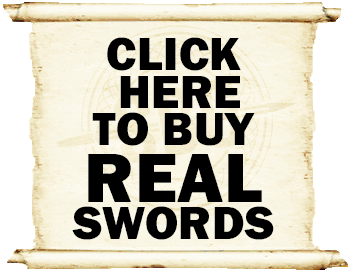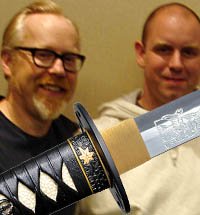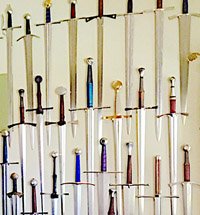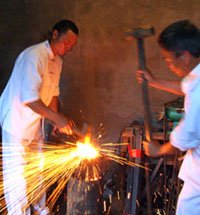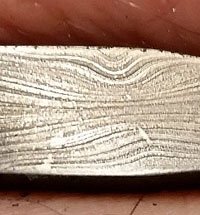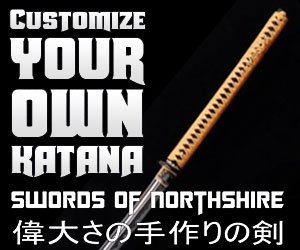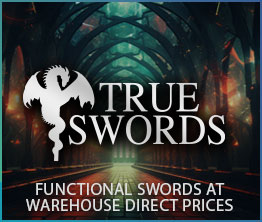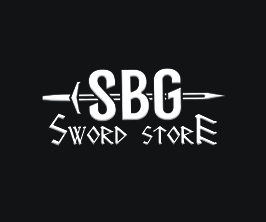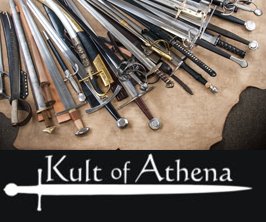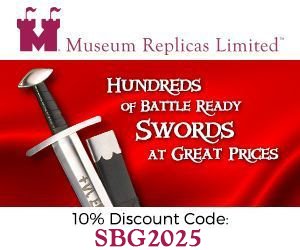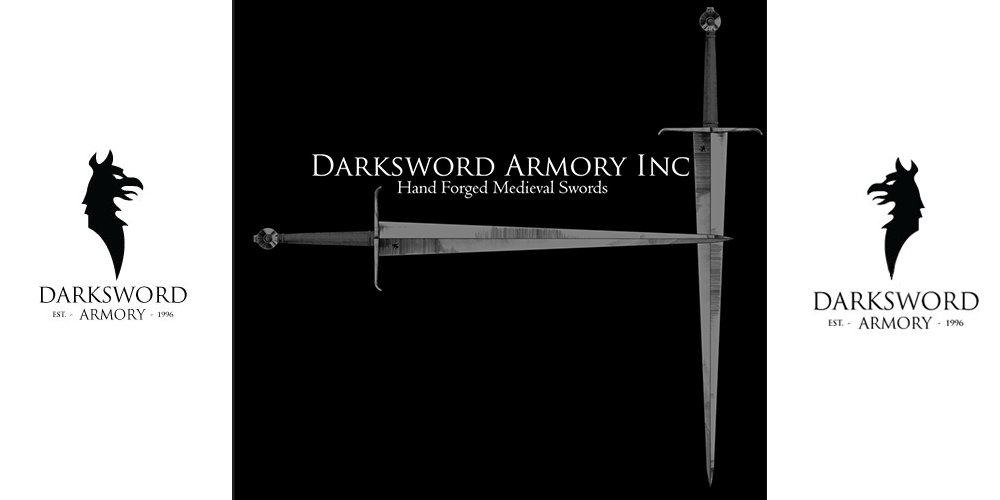Recent Articles
-
Christmas Sword Buying Guide 2025
Dec 03, 25 10:53 PM
Interview with Henry Thomas

Interview Originally appearing in the June 1st 2016 Edition of the Sword Buyers Digest Online Magazine
From time to time SBG has had the privilege of
interviewing people in the sword, martial arts, or reenactment
communities for the Digest. This month we have a special treat - an
exclusive interview with Hollywood actor and Western Martial Arts
Instructor Henry J. Thomas Jr!
Born in Texas in
1971, Thomas started acting at a young age and made waves in Hollywood
as the lead character Elliot Taylor in Steven Spielberg's ET: The Extra-Terrestrial (1982). Since that time he has accumulated more than 40 film credits to his name and played characters in Legends of the Fall (1994), All the Pretty Horses (2000), and Gangs of New York
(2002). Thomas comes to us today to talk not only about his
accomplished film career but also about his work as an experienced
teacher in a HEMA-member martial arts class. A fan of swords and fantasy
stories himself, Thomas has recently written a fantasy novel of his
own. We hope you enjoy our conversation with Henry J. Thomas Jr!
- Daniel Dacombe
on behalf of the Sword Buyer's Guide
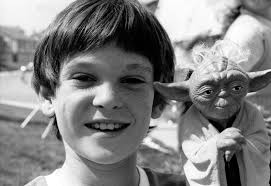 Henry Thomas circa E.T. era with Yoda
Henry Thomas circa E.T. era with YodaQ: Where does your interest in swords and sword fighting come from?
A: It’s cliché, I know, but most likely from watching the lightsaber duel in ‘Star Wars’ as a boy. My mother was also a fan of old films so I saw a lot of Errol Flynn/Robin Hood fencing as a boy. Once Dungeons & Dragons and other fantasy things sort of ran their course, my brain started wanting to sift the historical truth out of all the fantastical and I started looking at fact, but of course that took a long time.
Q: So where did you learn your swordplay? What styles are you familiar with?
A: I was introduced to fencing through stage combat training for a film called ‘Valmont’ in 1988, shot in France. I was 17 and I learned a choreographed fight with the smallsword, an 18th century duelling weapon. My instructors encouraged me to continue fencing, and I loved it so I did. This led me to explore Classical fencing and olympic sport fencing, but I was always more interested in historical stuff so I started doing rapier combat and I started reading old martial texts like Silver and Saviolo. That was when I first realized that there was a martial tradition to all of these things, that they all came from something earlier, and my curiosity was piqued. This led me to study the Longsword.
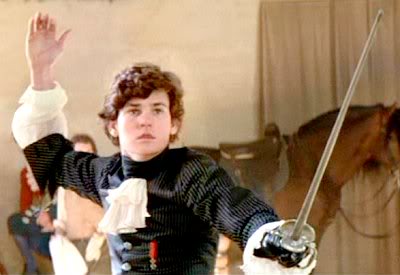 Henry in the film, Valmont 1988
Henry in the film, Valmont 1988Q: I understand that you teach medieval combat, is that correct? Could you tell us a bit about what you do in your class?
A: Yes I am an instructor at Kron Martial Arts Los Angeles, we teach a medieval German (Johannes Liechtenauer) tradition and students learn the whole fight with several different weapons both unarmoured and armored often involving grappling and taking your opponent to the ground. It’s a system that I like very much and our entire curriculum is taken from historical texts. It’s very different from touching an opponent and saying ‘got you’, but by no means is it any less elegant or refined.
Q:
Like any martial art, I'm sure teaching sword classes must result in at least
some injuries. What are the most common injuries you see in your classes?
A: We try safety and control and use a lot of protective gear, but being human, accidents happen. People generally will experience bruises regularly, hand injuries are probably the most common injuries in HEMA. That being said, in my 6 yrs. As an instructor I’ve seen 3 hand injuries and one of them resulted in broken bones. This from sparring.
Q: What differences are there between the kind of instruction you offer and groups like HEMA and the SCA?
A: Kron Los Angeles is a HEMA alliance member, so we are part of a larger group of scholars and schools who study western martial arts traditions, and this helps us to have affordable insurance for our members and offer them other avenues to explore outside of our club. At Kron LA you learn a German tradition taken from several medieval fighting manuscripts, covering fighting armored and unarmoured with an array of weapons and also covering unarmed combat.
I haven’t had any experience with the
SCA in recent years so I don’t know if they offer any kind of instruction, but
their style of combat and HEMA is very different.
Q:
How could someone prepare to take classes with someone like yourself? What
equipment would they need, and at what cost? Can beginners borrow equipment
while they are starting out?
A: All you really need is the right frame of mind. If you have an interest in learning a martial art and a willingness to show up once or twice a week, classes are available. We have equipment to lend to beginners, and you don’t need any gear to start. Contact us on facebook or via our meetup group, your first lesson is always free.
Q: What could a student of yours expect to experience as a beginner? As they
gain experience? Do you have some recommended reading for people who want to
study it for themselves (books, websites, etc)?
A: A new student should expect to learn basics with the longsword for the first few months. As you learn more techniques and gain some knowledge you will apply it to other weapons in the system, like dagger, sword and buckler, staff, messer. There are plenty of books and websites but by far the best instruction is practical, so I recommend joining some club or group.
Q: In what roles have you had a chance to use your skill with swords and swordfighting?
A: Sadly to date my last swordy bit was ‘Valmont’! That said, I think any kind of martial arts training is very good for people in everyday life, because if the art is good then you can apply those principles to any situation, it doesn’t have to only be a violent expression. The most important thing in sword fighting is control.
Q: Would you say you have had any memorable moments when filming sword combat – injuries, near misses, or experiences you’ll never forget? If so, please tell us about them.
A: A good example of losing control, my first scene in Valmont and we’ve been shooting all day 11 or 12 hours and I’ve been doing the choreographed fight for most of that. I’m tired and my sword is maybe a pound and a half but it feels like a ten pound weight. I’m springing about, lunging, etcetera, and the director is yelling ‘Kill him! Kill him!’ so I lunge and rip my pants and my fellow actor parries the tip of my sword down across his forehead. Fortunately, he was only slightly scraped and it was the last shot of the day, but not my shining moment.
Q: What initially got you more interested in doing taking more “combative” roles in your acting career?
A: I’ve always wanted to be in a medieval period film, or a fantasy film. That’s always been a dream of mine. I have my own harness and everything all I need is a script and a horse. And a lance. And a saddle.
Q: It seems like it would be very useful for actors to have at least some kind of skill with medieval martial arts, as a resume builder if nothing else. Is it common that actors who get chosen for these roles have as much experience in this area as yourself? How could having these skills be useful in different film roles - as a lead or supporting actor, an extra, or stunt person?
A: Probably the last priority is having
an actor well versed in any martial skills.
Part of what is expected of you as an actor is to be able to learn
things quickly, pick up new things easily, so its sort of expected that you
would or should just be able to pick things up, like swordfighting or playing
an instrument, or faking it at least.
The truth is that it takes time to master things. Knowing is always better, but sometimes this
is not even a thought to a production.
Time is money and there isn’t much scheduled in terms of training the
actors. In my mind Id rather put someone
who knows how to ride on the back of the horse, but if you don’t know horses
then you just say ‘well anyone can do that, it’s easy’ and it just fixes
itself. I think the same attitude is
taken with swordfights, no one really knows what a swordfight should look like,
so….we see a lot of bad movie fighting when it comes to swords. If the actors don’t know what they’re doing,
and the director doesn’t get it either then it’s the fight coordinator trying
to get them to look earnest at least and that doesn’t always sell it.
Q: Do you think medieval martial arts experience is something that directors
and producers should be looking for when they make movies like this?
A: I think using what we know about medieval fighting and showing how dynamic it was could be interesting to see.
Q: How would someone in the Hollywood/LA area go about joining one of your
classes?
A: Our meetup group or our facebook page has all the info
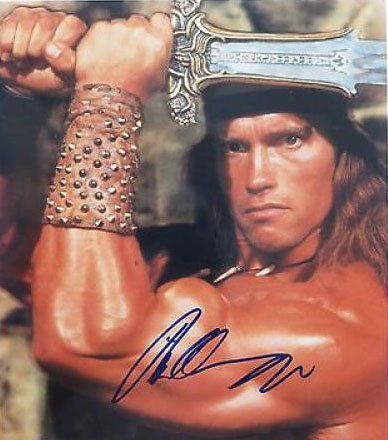
Q: I understand that when you were a child, you were quite the fan of Conan. I've heard that you even received an autographed photo from Arnold Schwarzenegger himself in his full Conan getup. Is that true?
A: Yes it’s true. I did a film ‘Cloak & Dagger’ in 1984 and Arnold was promoting ‘Conan the Destroyer’ with Grace Jones in Las Vegas at this entertainment convention called ‘Sho-West’ I think. I met him and a few weeks later I get this framed picture in the mail, pretty cool.
Q: I remember watching those Conan movies as a kid - they were probably very formative for a lot of us sword collectors. What did the original film mean to you? How do you feel about the upcoming Conan film, also starring Arnold Schwarzenegger?
A: It was the first sword fantasy film for me, and I loved it as a kid it scared me. The way of steel! That’s scary. I’m looking forward to seeing the new one.
Q: Would the kind of weapons training you've been doing prepare you to act in a movie as intense as Conan?
A: Yes. I think the problem is that people have a lot of misconceptions about how weapons are used and that has led to a lot of bad movie fighting. Also, stage combat is meant to look flashy and big for the audience, and that makes you dead in a ‘real’ fight. The other problem is that most actors aren’t given enough training at it beforehand and there isn’t room in the budget for lengthy rehearsals.
Q:
According to Arnold, the new Conan movie is going to be set several decades
after the first film. Assuming you were able to cherry pick a dream role for
yourself, who would that be? The son of Subotai, a mercenary, or thief? What
skill set could you bring to a production like that to make the audience
experience more immersive?
A: All I need is a sword and a horse and my lines. The stunt coordinator would probably hate me.
Q: How can the film industry harness groups like HEMA to improve background
combat in movies to add more realism, and move away from the woodenness extras
are currently bringing to productions? Would it be possible to form a
professional troupe of battle ready extras that can be hired en masse?
A: It would be great to offer workshops to fight coordinators and their stunt workers, because those are the guys and girls who will affect the most direct change on the face of it. A troupe would be amazing, and probably a lot of fun to coordinate, but the likelihood of being hired en masse on a regular basis would be slim.
Q: Are there other fantasy movies or tv shows you enjoy? What are some things that fans can look for in a movie or series to see if the combat is "realistic?"
A: I watch game of thrones, but the only realistic sword move I’ve ever seen was in ‘Brave’ by animated characters.
Q:
Speaking of reboots - what are your thoughts on the upcoming Highlander reboot?
Were you a fan of the original?
A: There can be only one!
Q: Ok, so standard question from one sword collector to another – what’s in your collection? And do you have any favourite blades? If you had to take one sword with you during a zombie apocalypse, which would it be?
A: [My friend] sent me some great swords so I have a few of his choice pieces. I have a few European swords, mostly replicas. I have a Scottish Broadsword that is genuine, still sharp. I have a longsword from Albion that is very nice, and a bastard sword from Arms & Armor that is a great cutter. That last would be my pick for Zombie apocalypse, but why do we only get to take one I ask you?
Q: I understand you’ve recently written a fantasy novel. What can you tell us about the book, without giving too much away, and when will it be published?
A: Yes, my book follows the physical and spiritual journey of a young soldier and his commander, who is a sociopathic egomaniac, after they are defeated and taken captive by their enemies. The soldier agrees to guide a holy woman to his capital city to preserve the lives of his fellows. I’ve been out to publishers for a year with it and although I’ve been told this is normal remaining hopeful has been and is challenging at times. Never fear though because I plan to self publish if met with rejections.
Q:
When it came to writing your book, how did your study of medieval martial arts
influence your use of swords and combat in the story?
A: It made the action sequences a lot easier to visualize, for sure, and practitioners will be able to recognize techniques in the writing if I’ve done my job well enough.
Q: World building seems like such an intimidating part of writing fantasy
fiction. How difficult did you find the process, and were there any significant
roadblocks you encountered?
A: Yes, it was very daunting. I had to really work it out, and a big problem for me was trying to make the world economy make sense. I had to invent a lot of back story and delve into it more than I thought I needed to in the beginning. The problem is that the world has to make sense on so many levels and you can’t skimp on any of them or it will come back and bite you later.
Q: When I think of fantasy writers, I can notice a stark difference in the ones
who seem to "know their stuff" when it comes to combat. There's writers
like R.A. Slavatore and Brandon Sanderson, who write very detailed and
realistic fights even in their fantasy contexts; on the other side are writers
who seem to "skim over" fight scenes - or even write them badly. Who
are some writers that you think are "getting it right" when it comes
to medieval style combat in fiction?
A: I like the writers who make me feel like I'm there, if they don’t know what they're talking about they take me out of it, if they know that they don’t know enough about fighting to explain it then they can usually bury it in character emotion and situational drama and I don’t notice so much.
Q: As a writer, what were some of your influences for this book – do you have a favourite genre or author(s)?
A: My favourite writer is Cormac McCarthy, but I love a great fantasy novel. JRR Tolkien, GRR Martin, Robert Jordan, Ursula Le Guin, Lloyd Alexander, C.S. Lewis, theirs were the books I read that had the most influence on the style of fantasy I write.
Thanks for your time Henry.

Buying Swords Online Can Be DANGEROUS!
Find the Best Swords in the:
Popular & Recommended ARTICLES
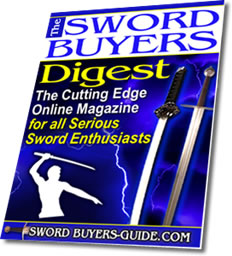
The ONLY true free online magazine for sword enthusiasts. Delivered once a month on the 1st day of the month, no filler and no BS, just the latest sword news & info delivered straight to your inbox.
